Many are tying the Democrat losses in the election to high inflation in recent years. There's some truth to that, but it's complicated and it's crucial to take the right lessons.
There are many lessons to learn from the election, but I see a wrong lesson circulating that must be nipped in the bud. Here is an example from Betsey Stevenson, a professor of economics who served in the Obama Administration: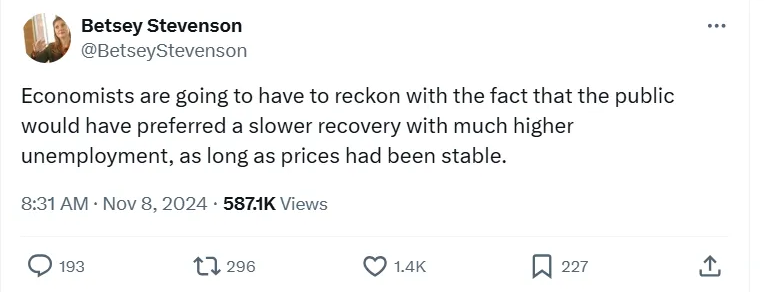
I’m not taking part in the reckoning because it’s not true. People want low unemployment and low inflation. The real lesson is that leaving inflation to the Fed alone was not good enough. Also, the simple Phillips curve trade-off between inflation and unemployment is not a thing, and leaning on it would have led to worse outcomes in people’s lives and at the ballot box.
Unemployment Hurts All Workers.
High inflation is widely unpopular, affects most families, and creates hardship for some, often those with the lowest incomes. So, how does that compare to unemployment? There is a common misunderstanding that inflation affects everyone, but unemployment only affects the unemployed. We hear it from people:
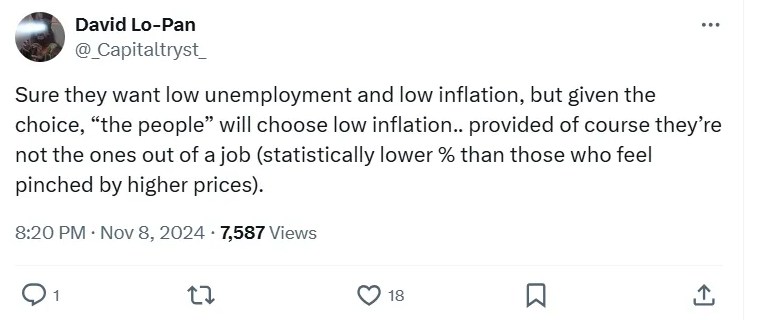
And we hear it from Nobel prize winners. Former Fed Chair Ben Bernanke made a similarly misguided argument:
The difference between inflation and unemployment is that inflation affects just everybody. Unemployment affects some people a lot, but most people don’t respond too much to unemployment because they’re not personally unemployed. Inflation has a social-wide kind of impact.
Wrong. High unemployment is “social-wide,” too. It’s a symptom of a lousy labor market, with smaller paychecks, fewer jobs, and less bargaining power. A lousy labor market is a hardship for nearly all workers. My earlier post lays out some of the data and also discusses the long-term adverse effects of high unemployment.
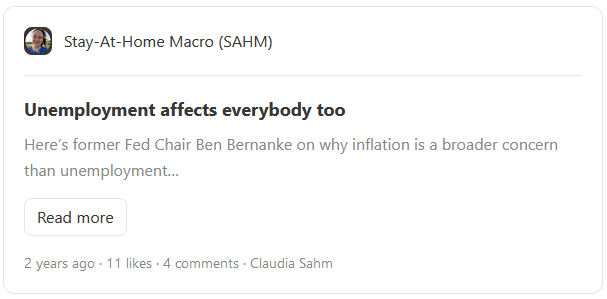
Framed as a lousy labor market, few would choose high unemployment.
Better Outcomes on Inflation Require Better Tools.
Inflation loomed large in recent elections—in the US and worldwide. The right lesson is to find better tools to prevent and fight inflation, not to throw in the towel on unemployment. It is not an easy task, but it is not impossible.
The existing set of tools for managing inflation is almost entirely based on monetary policy and is useful but insufficient. (I have written extensively on that: here, here, here, and here, for example.) The global pandemic and Russia’s war in Ukraine set off a cascade of supply disruptions to goods and labor. Due to the pandemic, there were also abrupt shifts in demand from services to goods and back to services.
Raising interest rates and anchoring inflation expectations — the standard toolkit to fight inflation worldwide — could not quickly wrestle inflation down. Higher interest rates largely work by lowering demand. There was excess demand due to the generous fiscal relief and the pent-up demand from limited services spending during the pandemic, but lowering demand was insufficient. It did not address the root causes of supply-driven inflation and could not be targeted to the more acutely felt forms of inflation like food, shelter, and energy.
More unemployment, such as from less fiscal relief or even higher interest rates, would not have spared us from the highest inflation in decades. That simplistic Phillips Curve logic would have created even more hardship.
New tools to prevent and fight inflation would be a better outcome of our reckoning. Isabella Weber, an economics professor, has been at the forefront of the discussion. My earlier piece on her work on sellers’ inflation is a place to start, but it is best to follow her directly.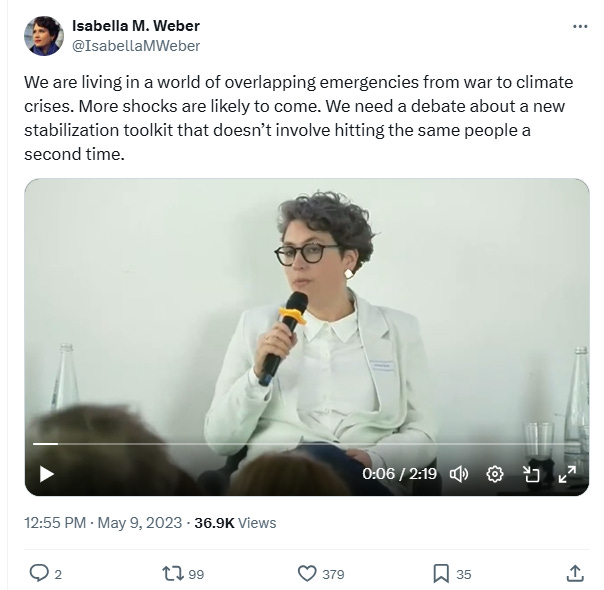
One prominent idea she is promoting is buffer stock reserves for critical industries. Think of this as the US Strategic Petroleum Reserve, but more broadly, it is for essential industries with large spillover effects on inflation in other industries.
Preparation is key. We entered the pandemic with a housing shortage, which put us at risk of the shock in demand that the pandemic caused. The result was a huge spike in shelter costs, which remains the main inflation source.
As Markus Brunnermeier, an economics professor, suggests, we must think about the resiliency of an economy before the crisis. There are also fundamental questions about whether a pandemic, war, or other disaster is a time for profiteering.
Thoughtful use of temporary taxes on extraordinary profits could be another tool to slow inflation. Unlike the broad brush of monetary policy, these alternate tools would require tailoring. Individually, the effects on inflation would be limited, but combined together with monetary policy, they could make a substantial difference.
The reckoning is global. Inflation loomed large in the US election and in recent elections around the world. As the chart from the Financial Times shows, every incumbent party facing an election in 2024 lost vote shares.
The fall in the vote share for Democrats (red dot) was smaller than that for other incumbent parties. Recall that overall economic outcomes have been the best in the US. Other countries experienced high inflation, but the US experienced high growth and low unemployment. Even so, an election loss is a loss.
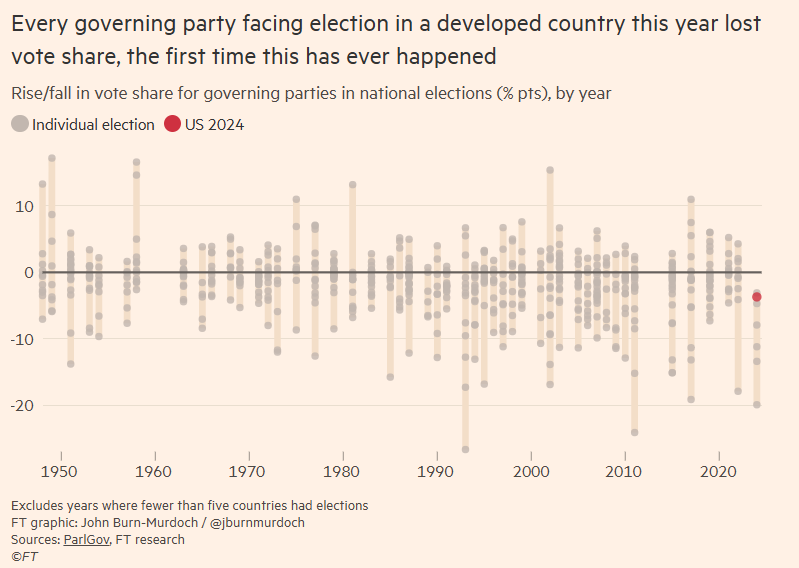
The anti-incumbent pattern makes sense. Inflation is a universal hardship, and the lack of tools to fight it is, too. Monetary policy is the worldwide go-to for inflation. The US is not alone in its need for a reckoning.
The Story Matters.
High inflation was a problem, reaching levels not seen in decades and lasting longer than expected. Inflation is close to normal now, but the higher prices still loom large. In contrast, the labor market has been the success story of the recovery—getting millions back to work quickly, supporting large wage gains, especially among low-wage workers, and creating millions of new jobs. Those successes are crucial to countering the hardship of higher prices, but the successes did not loom as large in the public mind. Partly, it is psychology. Partly, it is storytelling.
Last year, I wrote at Bloomberg Opinion on how the news and social media could make perceptions of the economy worse, even when most Americans were better off financially:
So, what is going on? And why is pessimism worse than at times when the economy was objectively worse, like in the 1970s and early 1980s? The answer is a toxic brew of bad events, not the least of which are the media feeding the human tendency toward the negative and social media spreading bad news faster and wider than ever before. Social media, which began in earnest in the early 2000s, could help explain why current views are more negative than today’s economic conditions would have predicted in the past.
Inflation is bad news, and content about inflation often goes viral. What the Democrats needed was less bad news. According to psychology research, more good news is not enough to counteract bad news. Instead, Republicans managed to turn good news about the economy into bad news. Here is Trump on the campaign trail, painting the jobs numbers as a fraud, complete with a tall tale about a whistleblower.
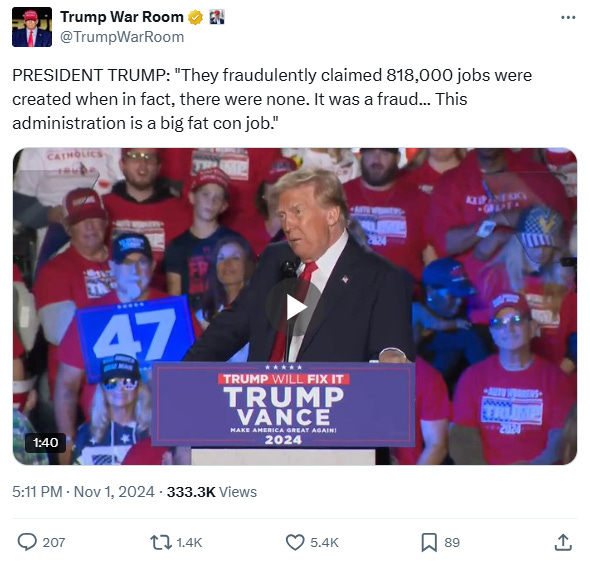
It’s compelling, but, as I explained this summer, there is no conspiracy in the labor market revisions. The Democrats could not soften the bad news of inflation by boosting the good news of high wage growth, and they failed to defend the actual good news in the economy from false claims. There was no whistleblower.
To be clear, it’s not all in our heads. Inflation caused real hardship, but inflation alone is not the economy. The anger is real. Heather Long at The Washington Post summed it up well. It’s a complex mix of what happened and how we processed it:
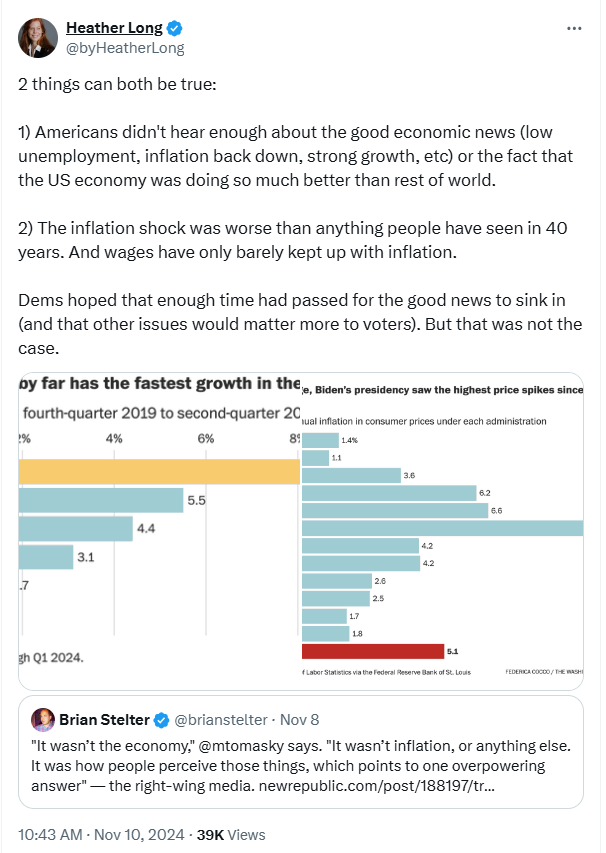
The reckoning from the election—even when focused on inflation—must go well beyond the economics and the tools of economists.
In Closing
It is time for a reckoning among economists. But, the reckoning—one of many—is that we need more tools to fight and prevent inflation than the Fed alone.
Higher interest rates played a role in bringing inflation down, but the ‘passage of time’ reversed much of the Covid-driven inflation. That was too slow and painful.
We can do better. The voters told us we must do better.
